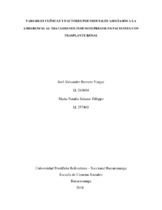| dc.contributor.advisor | Director. Pérez Rivero, Paula Fernanda | |
| dc.contributor.author | Romero Vargas, Joel Alexander | |
| dc.contributor.author | Salazar Fillippo, MarÍa Natalia | |
| dc.coverage.temporal | 2018 | |
| dc.date.accessioned | 2020-06-08T14:54:11Z | |
| dc.date.available | 2020-06-08T14:54:11Z | |
| dc.date.issued | 2018 | |
| dc.identifier.uri | http://hdl.handle.net/20.500.11912/5554 | |
| dc.description | 100p.: (pdf); il; tablas; anexos. | spa |
| dc.description.abstract | La supervivencia de un paciente sometido a trasplante renal se encuentra asociada con la adherencia al tratamiento inmunosupresor que, en caso de presentar una adherencia inadecuada, implicaría la pérdida del injerto que conllevaría a un deterioro considerable en la salud del paciente, un desgaste en sus cuidadadores y un gran costo para el sistema de salud. Objetivo: describir la relación entre las variables clínicas, los factores psicosociales y la adherencia del tratamiento inmunosupresor en pacientes con trasplante renal de la Fundación Cardiovascular de Colombia. Método: estudio cuantitativo no experimental de cohorte abierta con muestreo tipo censo no probabilístico. Se empleó el Life Orientation Test-Reviewed (LOT-R) para medir optimismo disposicional, Hospital Anxiety and Depression Scale (HADS) para ansiedad y depresión, Medical Outcomes Study-Social Support Survey (MOS) para apoyo social, y Basel Assessment of Adherence to Immnosuppressive Medication Scale (BAASIS) para adherencia. Resultados: Se evaluó un total de 112 pacientes 59% hombres y 41% mujeres mayores de 18 años, con trasplante renal de la Fundación Cardiovascular de Colombia. Se encontró una diferencia estadísticamente significativa en los grupos de edad respecto a la adherencia a los medicamentos en donde pacientes con menos edad mostraron ser menos adherentes (p=0.016). En cuanto a los factores clínicos se evidenció una diferencia estadísticamente significativa en el tiempo de trasplante en relación con la adherencia al tratamiento, siendo menos adherentes aquellos que manifestaron más tiempo de haber sido trasplantados (p<0.01). Por último, dentro de los factores psicosociales estudiados, se encontró una diferencia significativa con la variable de ansiedad, siendo más adherentes los pacientes que presentaron ausencia de ansiedad (p <0.01). Conclusión: Se concluyó que la edad, el tiempo de trasplante y la ansiedad son considerados factores de riesgo que inciden en que el paciente sea adherente o no al tratamiento inmunosupresor. | spa |
| dc.description.abstract | The survival of a patient undergoing kidney transplantation is associated with adherence to immunosuppressive therapy. Objective: describe the relationship between clinical variables, psychosocial factors and the adherence to immunosuppressive therapy in patients with renal transplantation from Fundaci6n Cardiovascular de Colombia. Method: quantitative non-experimental open-cohort study with non-probabilistic census-type sampling. The Life Orientation Test-Reviewed (LOT-R) was used to measure dispositional optimism, the Hospital Anxiety and Depression Scale (HADS) for anxiety and depression, the Medical Outcomes Study-Social Support Survey (MOS) for social support, and the Basel Assessment of Adherence to Immunosuppressive Medication Scale (BAASIS) for adherence. Results: A total of 112 patients were evaluated 59% men and 41% women) older than 18 years, with a kidney transplant from Fundaci6n Cardiovascular de Colombia. Another statistically significant difference was found, where patients with less age were less adherent (p:0.016). Regarding the clinical factors, a statistically significant difference was also found in the time post-transplant in relation to adherence, in which those patients who indicated more time of being transplanted were less adherent (p <0.01). Finally, within the psychosocial factors studied, a significant difference was found with the anxiety variable, in which those with absence of anxiety showed to be less adherent (p <0.01). Conclusion: It was concluded that age, post-transplant time and anxiety are considered risk factors that affect the patient's adherence to immunosuppressive therapy. | eng |
| dc.format.mimetype | application/pdf | |
| dc.language.iso | spa | |
| dc.publisher | Universidad Pontificia Bolivariana | spa |
| dc.rights | Attribution-NonCommercial-NoDerivatives 4.0 International | * |
| dc.rights.uri | http://creativecommons.org/licenses/by-nc-nd/4.0/ | * |
| dc.title | Variables clínicas y factores psicosociales asociados a la adherencia al tratamiento inmunosupresor en pacientes con trasplante renal | spa |
| dc.type | Trabajo de grado | spa |
| dc.publisher.department | Escuela de Ciencias Sociales | spa |
| dc.publisher.program | Psicología | spa |
| dc.type.hasVersion | publishedVersion | spa |
| dc.description.sectional | Bucaramanga | spa |
| dc.description.degreename | Psicólogo | spa |


